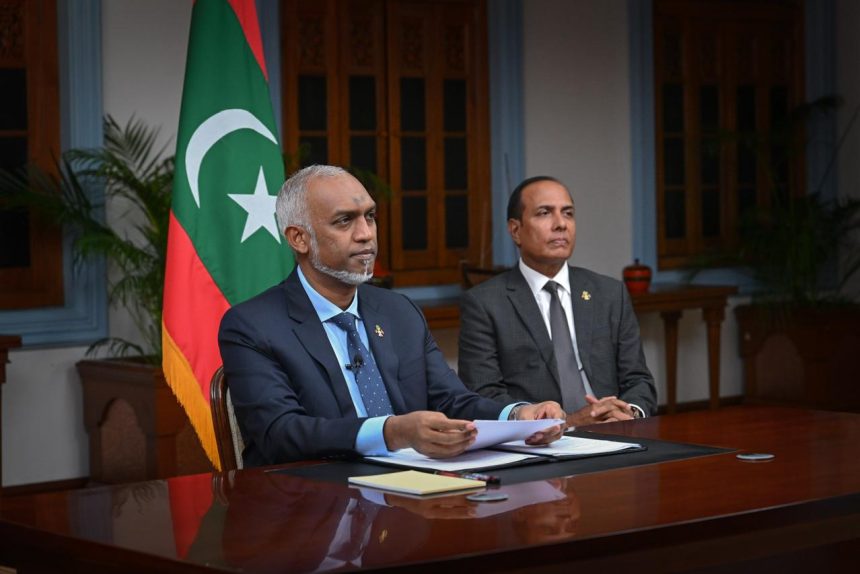In a compelling address as Co-Chair of the Strategic Advisory Group for Small Island Developing States (SIDS), President Dr. Mohamed Muizzu emphasized the critical need for immediate action to address the intertwined challenges of debt distress and climate financing faced by SIDS.
Speaking at the side event titled “Building Resilient Futures: The Global SIDS Debt Sustainability Support Service,” President Muizzu underscored the urgency of operationalizing the Debt Sustainability Support Service (DSSS) to usher in a new era of sustainable development for these vulnerable nations.
Highlighting the precarious situation, President Muizzu noted that over 40% of SIDS are already in or nearing debt distress, grappling simultaneously with pressing climate financing needs. He asserted that achieving debt sustainability is paramount for realizing the resilient development goals outlined in the Antigua and Barbuda Agenda for SIDS (ABAS).
The President passionately called for the immediate operationalization of the DSSS, emphasizing that resolving debt issues is not only vital for sustainable development but also for addressing the interconnected challenges of climate change, environmental degradation, and pollution. He highlighted the shifting geopolitical dynamics that necessitate multilateral, multi-stakeholder solutions to development challenges. In this context, the Maldives has proposed a debt-relief-for-resilience-building mechanism, rewarding countries investing in resilience with debt relief.
Advocating for a country-led approach, President Muizzu stressed the importance of considering each nation’s unique circumstances and sensitivities. He explained that such an instrument aims to create fiscal space for investment in sustainable development by linking debt relief to resilience-building milestones. The upcoming Fourth International Conference on Financing for Development (FfD4) was described by the President as a “golden opportunity” to promote and garner global recognition for the DSSS as a critical tool for ensuring debt sustainability in SIDS. While the initiative has already received acknowledgment from many nations, he emphasized that international cooperation and participation are essential to scaling up the implementation of innovative debt mechanisms and concessional finance.
Concluding his remarks, President Muizzu stated that debt sustainability transcends mere figures—it is about protecting lives, safeguarding livelihoods, and securing our collective future. The Maldives, alongside Antigua and Barbuda, co-chairs the Strategic Advisory Group, demonstrating a united front in addressing these pressing issues.
The DSSS offers a pioneering mechanism tailored to the unique challenges of SIDS. It aims to support these nations in managing and reducing debt, particularly debt incurred due to climate shocks, while facilitating sustainable recovery efforts. As President Muizzu remarked, “SIDS are at the frontline of climate change, battling rising seas, intensified storms, and other climate-induced shocks.”
The international community’s support and cooperation are crucial in implementing these innovative solutions, ensuring that SIDS can achieve resilient and sustainable development in the face of escalating climate challenges.




